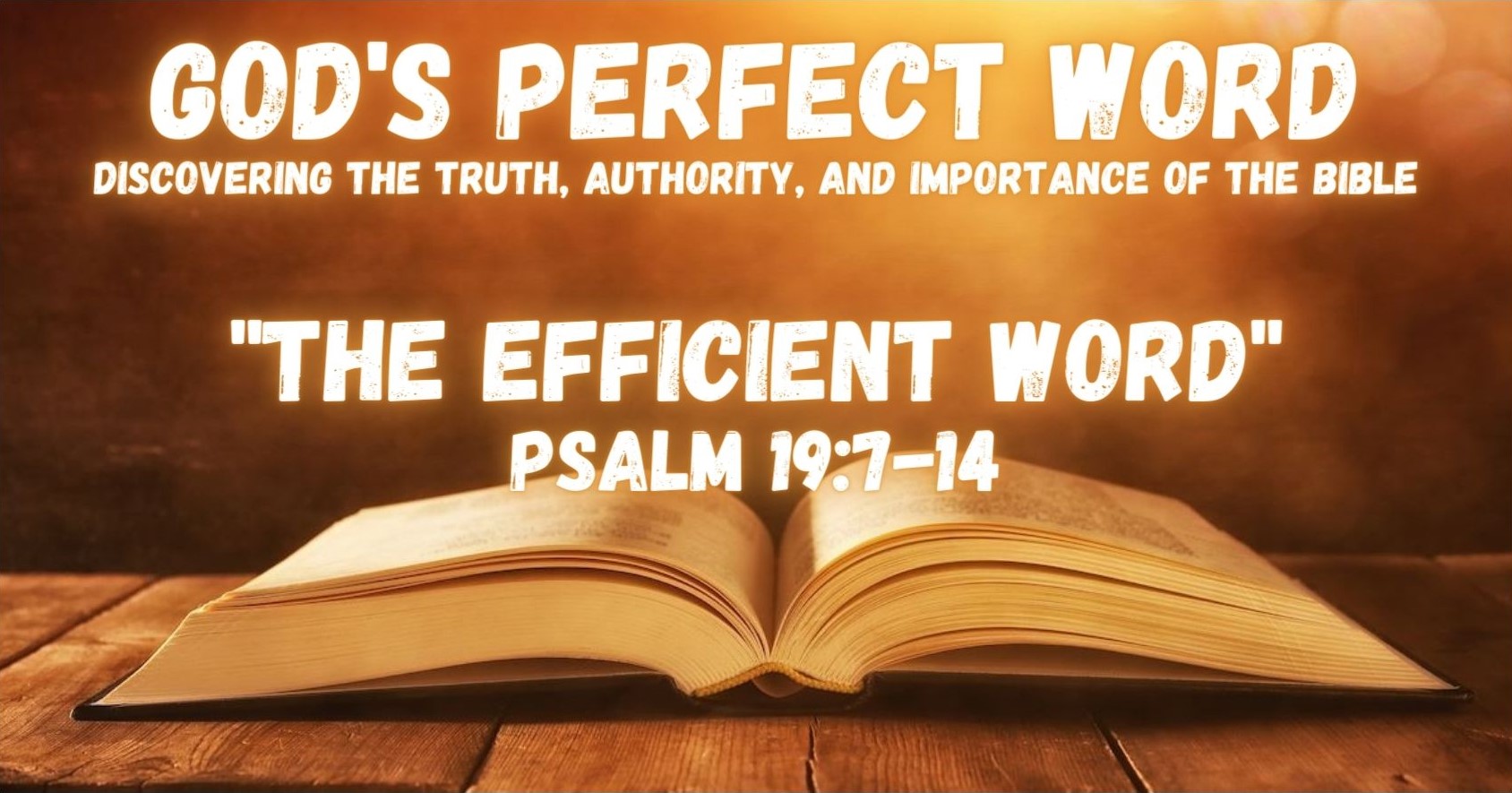Psalm 19:7-14
7 The law of the Lord is perfect, converting the soul: the testimony of the Lord is sure, making wise the simple. 8 The statutes of the Lord are right, rejoicing the heart: the commandment of the Lord is pure, enlightening the eyes. 9 The fear of the Lord is clean, enduring for ever: the judgments of the Lord are true and righteous altogether. 10 More to be desired are they than gold, yea, than much fine gold: sweeter also than honey and the honeycomb. 11 Moreover by them is thy servant warned: and in keeping of them there is great reward. 12 Who can understand his errors? cleanse thou me from secret faults. 13 Keep back thy servant also from presumptuous sins; let them not have dominion over me: then shall I be upright, and I shall be innocent from the great transgression. 14 Let the words of my mouth, and the meditation of my heart, be acceptable in thy sight, O Lord, my strength, and my redeemer.
The Word of God cannot fail. It is efficient in what God has purposed it for. The prophet Isaiah wrote, “So shall my word be that goeth forth out of my mouth: it shall not return unto me void, but it shall accomplish that which I please, and it shall prosper in the thing whereto I sent it” (Isaiah 55:11). God’s Word is not only sufficient (2 Timothy 3:14-17), it is efficient. Psalm 19 speaks to the two types of revelation of God or two ways He is revealed to us. First, there is general revelation which is how God has revealed Himself in creation, history, and the human conscience (Psalm 19:1-6; Romans 2:14-15). Second, there is special revelation which is the Word of God (the Bible) and the Son of God (Hebrews 1:1-4; Psalm 19:7-14). Through His revelation of Himself in Scripture, God accomplishes His purposes in the life of His people. In Psalm 19:7-14, there are eight things that the Word is said to accomplish.
First, the Word converts. The Word of God leads a person to salvation. Without the knowledge of God and His way of salvation, a person cannot be saved. Paul told Timothy that the Holy Scriptures were sufficient to make him “wise to salvation” (2 Timothy 3:14-15). A person is changed when they encounter the Word of God.
Second, the Word gives wisdom. “For the Lord giveth wisdom: out of his mouth cometh knowledge and understanding” (Proverbs 2:6). God is the source of all wisdom. The fear of Him “is the beginning of wisdom” (Proverbs 9:10). Therefore, His Word gives wisdom to all who hear and obey it. It also testifies to Jesus Christ, “In whom are hid all the treasures of wisdom and knowledge” (Colossians 2:3).
Third, the Word gives joy. The Word gives joy in that it tells us that there is a good and righteous God with good and righteous standards. There is an explanation and answer for the evil and suffering in the world. This brings joy to the child of God’s heart, not that these things exist, but that we serve a God who will ultimately judge and deal with them and has provided salvation for all who will look to Him.
Next, the Word enlightens. The “pure” Word of God enlightens our eyes. It opens our eyes to the truth. “Faith cometh by hearing and hearing by the Word of God” (Romans 10:17). Without God’s Word, we would all be hopelessly wandering in the darkness, but it has come as a “lamp” to our “feet” and “light” to our “path” (Psalm 119:105).
The Word of God also humbles. The Word of God reveals to all people that they are sinners in need of a Savior (Romans 3:23). When you and I learn who God is from His Word and how sinful we are, it produces the “fear of the Lord.” This reverence for God is seeing Him and ourselves as we really are. This humbles us and brings us to cast ourselves on His mercy, not our self-sufficiency.
Sixthly, the Word teaches. We learn from God’s Word what God’s standards, or “judgments,” are. It shows us what is “true and righteous altogether.” When we see what God has done and commanded in the pages of Scripture, we learn who He is and what His will is.
The Word of God also brings satisfaction. Every born-again believer should desire God’s Word. Peter writes, “As newborn babes, desire the sincere milk of the Word, that you may grown thereby” (1 Peter 2:2). Every believer has a hunger that only the Word of God can satisfy (Matthew 4:4). We need its truth more than daily food and we should desire it more than all riches.
Lastly, the Word protects. The Word of God provides warning against sin and error. It protects us from wrong by warning us about it. The psalmist prays to be kept from “presumptuous sins” which are deliberate sins. The Word of God guards us from these by creating in us a “clean heart” and by sanctifying us. In John 17:17 Jesus prayed, “Sanctify them through thy truth. Thy Word is truth.” May we be able to say with the psalmist, “Thy word have I hid in mine heart, that I might not sin against thee” (Psalm 119:11).
In this series on God’s Perfect Word, we have learned a lot about the Bible and its truth. We have learned about the effects it has on the life of a believer. When we truly understand the nature of the Scriptures, we understand that we have been given something as precious as life itself. We have the eternal Word of God. What will we do with it? God has spoken. Will we listen to Him? James gives us some fitting words of application for us to hold with us in James 1:22, “But be ye doers of the word, and not hearers only, deceiving your own selves.”






